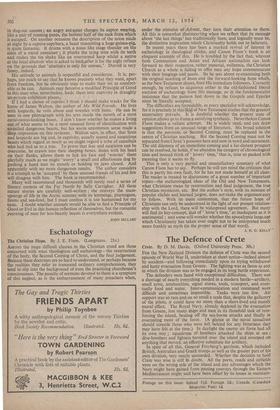Men and Beasts
Icebound Summer. By Sally Carrighar. (Michael Joseph. 15s.)
DEAN INGE once said something to the effect that it's difficult to imagine in what form animals would perceive the Principle of Good, even if they were capable of the effort. Would they, for instance, think solely of themselves and their families or might they not have an inkling of an idea about the needs of their race ? The point bristles with unanswerable questions. But there is no doubt whatever that animals could make a very vivid picture of the Principle of Evil. It would be in the form of the White Man, that irrational, bitter biped who either burdens them or eats them or else wipes them out without scruple and calls them Noble Beasts when they are dead or behind bars.
But if animals are not over-fond of mankind in general, I think a few of them might tolerate one or two of us. I am not at all sure what they would think about the authors of these two books. The first is a professional animal collector : the second cannot be defined so easily. He seems to like to loll about with lions and gain their respect. Both know a great deal about animals : both are thoughtful men.
In his first book, Durrell, the collector, tried to make us believe that he walked about in the tropics and pushed his hand into old tree stumps and holes in the ground, thereby extracting snakes and worse with the deft ability of a professional cherry-picker. Towards the end of his book we began to believe him. This was because he wrote directly and modestly and yet with such a gift of humour that each instant was an occasion. In this book the account of his expedition to British, Guiana is stuffed with exquisitely ridiculous situations. Electric eels wander about among the bare feet of •men
In dug-out canoes ; an angry ant-eater charges its captor wearing, like a pair of running pants, the bottom half of the sack from which it escaped. On another occasion the description of the noise made at night by a captive capybara, a beast resembling a huge guinea-pig, is quite fantastic. It drums with a noise like stage thunder on the sides of a metal container ; it plucks the tying wire with its teeth and makes the tin shake like an overturned harp whilst a native at the local abattoir who is asked to look,after it for the night refuses on the grounds that `abattoirs is only for cowses.' Durrell is very funny, indeed. His attitude to animals is respectful and considerate. It is, per- haps, too much to say that he knows precisely what they want, apart from freedom, but he obviously tries to make their lot as comfort- able as he can. Animals may perceive a modified Principle of Good in this man who, nevertheless, leads them into captivity in draughty un-private exhibition places. If I had a choice of captors I think I should make tracks for the home of James Walton, the author of My Wild Friends. He lives with leopards, he rolls about and wrestles with lions. He can be seen in one photograph with his arm inside the mouth of a most carnivorous-looking beast. I don't know whether he makes a living out of what seems to be a most unusual form of identification with so-called dangerous beasts, but his warm uncommon sense made a deep impression on this reviewer. Walton says, in effect, that lions and leopards are big and, in captivity, usually scared and suspicious beasts which regard us much as we might regard a tribe of cannibals who had tied us to a tree. To prove that fear and suspicion can be overcome, he crawls into their sleeping boxes, dozes with his head on their flanks, allows them to lick his face and 'worries' them playfully much as we might worry' a small and affectionate dog by pushing a hand into its mouth or holding its jaws closed. And apparently with no more dangerous results. The author considers it a triumph to be 'accepted' by these unusual friends of his and few will disagree with him. The book is recommended.
Many will recommend and thousands will surely read a series of literary cameos of the Far North by Sally Carrighar. All these nature stories are carefully well-written ; she conveys the mass- upsurge of life in the Arctic summer with its lemmings, ptarmigans, fawns and sea-fowl, but I must confess it is too humanised for my taste. I doubt whether animals would be able to find a Principle of Good or Evil in this human reflection of themselves, but the romantic yearning of man for less-beastly beasts is everywhere evident.
JOHN HILLARY











































 Previous page
Previous page